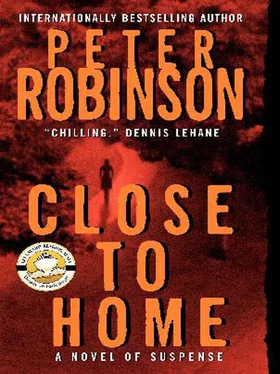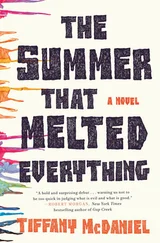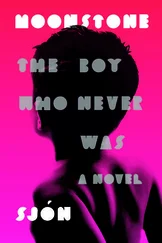“I have done nothing wrong,” said Wells, crossing his arms again.
The problem was, as Banks and Annie had already discussed, that the closed-circuit television cameras corroborated Wells’s story. Luke Armitage had entered Norman’s Used Books at two minutes to five and left – alone – at five twenty-four.
“What time did you close that day?” Banks asked.
“Half past five, as usual.”
“And what did you do?”
“I went home.”
“Number fifty-seven Arden Terrace?”
“Yes.”
“That’s off Market Street, isn’t it?”
“Close, yes.”
“Do you live alone?”
“Yes.”
“Do you own a car?”
“A second-hand Renault.”
“Good enough to get you out to Hallam Tarn and back?”
Wells hung his head in his hands. “I’ve told you. I did nothing. I haven’t been near Hallam Tarn in months. Certainly not since the foot-and-mouth outbreak.”
Banks could smell his sweat even more strongly now, sharp and acrid, like an animal secretion. “What did you do after you went home?”
“Had my tea. Leftover chicken casserole, if you’re interested. Watched television. Read for a while, then went to sleep.”
“What time?”
“I’d say I was in bed by half past ten.”
“Alone?”
Wells just glared at Banks.
“You didn’t go out again that evening?”
“Where would I go?”
“Pub? Pictures?”
“I don’t drink, and I don’t socialize. I prefer my own company. And I happen to believe that there hasn’t been a decent picture made in the last forty years.”
“Did Luke Armitage visit your house at any time that evening?”
“No.”
“Has Luke Armitage ever visited your house?”
“No.”
“He’s never even stepped inside your front door, not just for a moment?”
“I talk to him in the shop sometimes. That’s all. He doesn’t even know where I live.”
“Did you ever give him a lift anywhere?”
“No. How could I do that? I walk to and from the shop every day. It’s not far, and it’s good exercise. Besides, you know what parking’s like around the market square.”
“So Luke has never been in your car?”
“Never.”
“In that case,” said Banks, “I’m sure you won’t mind if our forensic experts have a close look at your house and your car. We’d also like to take a DNA sample, just for comparison.”
Wells stuck his chin out. “What if I do mind?”
“We’ll keep you here until we get a search warrant. Remember, Norman, I wouldn’t like to say judges are swayed by such things, but Luke Armitage came from a wealthy and well-respected family, while you’re a disgraced school-teacher eking out a living in a dingy used-book shop. And that shop was the last place we know Luke visited before he disappeared.”
Wells hung his head. “Fine,” he said. “Go ahead. Do what you will. I don’t care anymore.”
After a sleepless night on Saturday, Michelle had spent Sunday getting over the shock of what had happened in her flat and trying to rein in her emotional response in favor of more analytical thought.
She hadn’t got very far.
That someone had gained entry and arranged things in order to frighten her was obvious enough. Why, was another matter entirely. That the interloper knew about Melissa surprised her, though she supposed people could find out anything about her if they really wanted to. But given that he knew, it would have been evident when he searched her bedside drawers that the little dress was Melissa’s, and that its desecration would cause her a great deal of anguish. In other words, it had been a cold, calculated assault.
The flats were supposed to be secure, but Michelle had been a copper long enough to know that a talented burglar could get around almost anything. Though it went against every grain of Michelle’s nature not to report the break-in to the police, in the end she decided against it. Mostly, this was because Graham Marshall’s name had been written in her own red lipstick on the dressing-table mirror. The intrusion was meant to frighten her off the case, and the only people who knew she was working on it, apart from the Marshalls themselves, were other police officers, or people connected with them, like Dr. Cooper. True, Michelle’s name had been in the papers once or twice when the bones had first been found, so technically everyone in the entire country could know she was on the case, but she felt the answers lay a lot closer to home.
The question was, “Was she going to be frightened off the case?” The answer was, “No.”
At least there hadn’t been much cleaning up to do. Michelle had, however, dumped the entire contents of her bathroom cabinet and would have to contact her doctor for new prescriptions. She had also dumped the contents of the fridge, which hadn’t been a big job at all. More important, she had found a locksmith in the Yellow Pages and arranged to have a chain and an extra dead-bolt lock put on her door.
As a result of her weekend experience, Michelle felt drained and edgy on Monday morning and found herself looking at everyone in Divisional Headquarters differently, as if they knew something she didn’t, as if they were pointing at her and talking about her. It was a frightening feeling, and every time she caught someone’s eye she looked away. Creeping paranoia, she told herself and tried to shake it off.
First, she had a brief meeting with DC Collins, who told her he was getting nowhere checking the old perv reports. Most of the people the police had interviewed at the time were either dead or in jail, and those who weren’t had nothing new to add. She phoned Dr. Cooper, who still hadn’t located her knife expert, Hilary Wendell, yet, then she went down to the archives to check out the old notebooks and action allocations.
These days, since the Police and Criminal Evidence Act, there were very strict rules regarding police notebooks. You couldn’t leave blank pages, for example. Each page was numbered, and if you missed one by mistake you had to draw a line through it and write “Omitted in error.” Entries had to be preceded by date and time, underlined, and at the end of each day the officer had to draw a continuous line below the final entry. Most of this was to prevent officers from “verballing” suspects – attributing to them words they hadn’t used, confessions they hadn’t made – and to avoid any sort of revisions after the fact. Notes were made on the spot, often quickly, and accuracy was important because the notebooks might need to be used in court.
An officer’s notebooks could be invaluable when trying to reconstruct the pattern of an investigation, as could the action allocations, records made of all the instructions issued to investigating officers by the senior investigating officer. For example, if DC Higginbottom was asked to go and interview Joe Smith’s neighbor, that order, or “action,” would be recorded in the actions allocation book, and his record of the interview would be in his notebook. By looking at the actions, you could determine which areas of inquiry had been pursued and which had not, and by reading the notebooks you could unearth impressions that might not have made it into final statements and formal reports.
Completed notebooks were first handed to a detective inspector, who would look them over and, if everything was acceptable, send them to the records clerk for filing. That meant they piled up over the years. Whoever said we were heading for a paperless world, Michelle thought, as she walked along the rows of shelving stacked to the ceiling with boxes, obviously wasn’t a copper.
Mrs. Metcalfe showed her where the notebooks were filed, and Michelle went first, by instinct, to Ben Shaw’s. But no matter how many times she flipped through the boxes, checked and rechecked the dates, in the end she had to admit that if there had been notebooks covering the period of major activity in the Graham Marshall case, on the day of his disappearance, August 22, 1965, over the next month or two, then they had vanished.
Читать дальше












